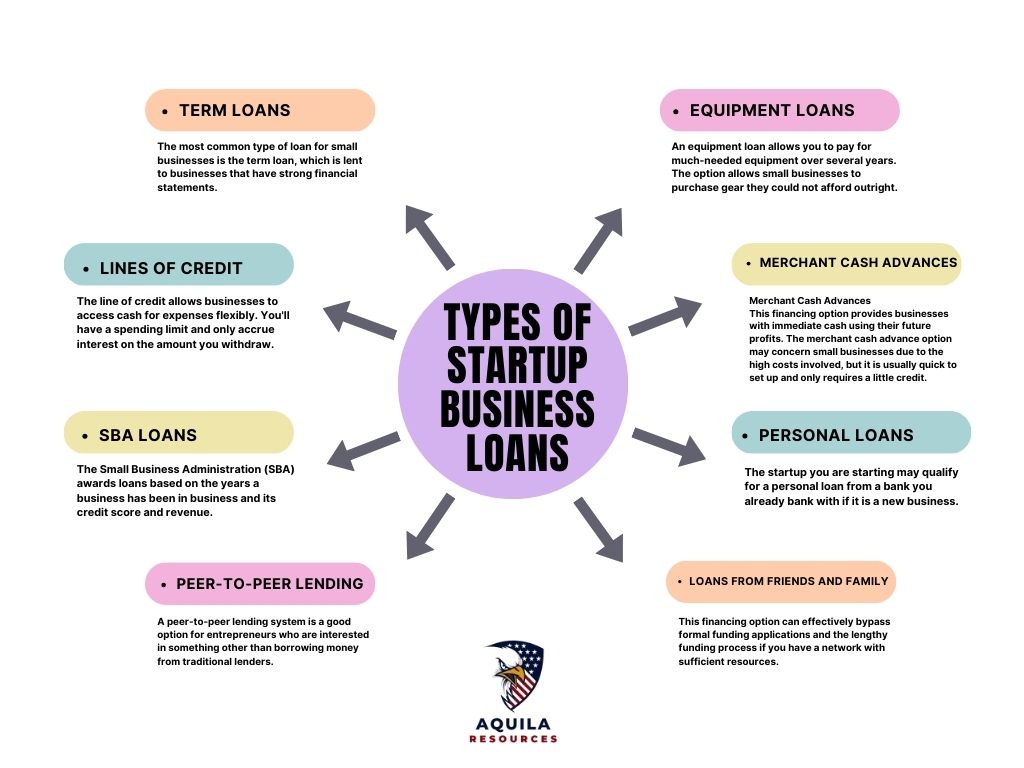There must be more than a great idea for success, but it’s hard to ignore the urge to start a new business. To make your idea a successful business, you will need to invest a lot of time and money, both from you and others.
Obtaining a startup business loan may be more difficult than borrowing for an established business, especially if you need a good credit score or industry experience. Many new founders have been successful with different types of funding and financing.
During the early stages of your entrepreneurial career, one of the most important decisions you’ll have to make is how you fund your startup costs. Despite this, finding funding for your business can be challenging, especially when it’s just getting started.
Starting your own business requires funding; a small business startup loan can help. A wide variety of business funding options can be used for this purpose – including credit cards, term loans, and lines of credit. Choosing the right fit for your business depends on its unique needs. You must understand how your funding options work before you make a decision. The following information will help you understand startup business loans.
What are Startup Business Loans?
Contents
- 1 What are Startup Business Loans?
- 2 How Startup Business Loans Work?
- 3 Types of Startup Business Loans
- 4 Small Startup Business Loan Requirements
- 5 How We Chose the Best Startup Business Loans?
- 6 How to Apply for Startup Business Loans?
- 7 How Should I Determine How Much Funding I Need?
- 8 How to Compare Startup Business Loans?
- 9 Alternatives to Startup Business Loans
- 10 What to Do If You Are Denied a Startup Business Loans?
- 11 FAQs

Business startup loans are not specific types of loans; they are any loans used to start a new company. The money can be used for various purposes, such as developing a product, hiring workers, leasing space, or buying inventory. Businesses in their early stages can also use a startup loan, such as those that have opened their doors but still need revenues.
There is no specific type of startup business loan. In the business world, it’s a term that refers to the funding that’s used to start or grow a startup. A startup financing program is another term for small business funding used for this purpose.
How Startup Business Loans Work?
The process of obtaining a startup loan works the same as obtaining a business loan: you apply for funding, a lender evaluates your creditworthiness, and if you are approved for a loan, you repay the funds with interest. The steps you need to follow when applying for a startup loan are:
Know the Requirements
Some aspects of startup loans allow them to be more flexible, such as accepting borrowers with low revenue streams. As a result of the high failure rate of new small businesses, you may have to meet other requirements to mitigate lenders’ increased risk. A higher interest rate, a personal guarantee, or a greater collateral requirement may be required for approval.
Launching your business before applying for funding makes you more likely to get a startup loan. Having a history of business operations is a big help when you are seeking funding for your business.
Gather Documents
Make sure you have the necessary documents before applying for a loan. The documents include basic information about you and your company, including your ID and Social Security number. Furthermore, you should gather statement information about your company’s bank accounts, licenses, and other details.
Business plans that show how the loan will be repaid and how you will use the funds can also be very helpful.
Focus on Credit
It’s also a good idea to improve your credit score. Your business’s credit score is often prioritized over the credit score of your personal business. You can get a business loan easier if you sign a personal guarantee if your credit is strong.
The last step is to limit the debt service coverage ratio. Before applying for a startup loan, avoid taking on too much other debt.
Types of Startup Business Loans

The lenders of startup loans know they’re lending money to support a new idea, so they don’t require business credit or high revenue. However, you can affect your loan eligibility and terms based on your credit score and industry experience. Additionally, you can finance your business in different ways. The following are eight common options.
Startup business loans come in a variety of forms for entrepreneurs, including:
Term Loans
The most common type of loan for small businesses is the term loan, which is lent to businesses that have strong financial statements. Specific amounts and interest rates are associated with these loans, either fixed or floating. Businesses use the majority of term loans to purchase new buildings, real estate, or equipment and often require a large down payment to reduce repayment amounts.
Lines of Credit
The line of credit allows businesses to access cash for expenses flexibly. You’ll have a spending limit and only accrue interest on the amount you withdraw. Like a credit card, you’ll choose when you withdraw your money and how much. When your business is under three years old, getting approved for a business line of credit can be challenging, and your debt can worsen.
SBA Loans
The Small Business Administration (SBA) awards loans based on the years a business has been in business and its credit score and revenue. A small business can take advantage of these loans because the qualifications and requirements are less demanding than a bank loan.
Peer-to-Peer Lending
A peer-to-peer lending system is a good option for entrepreneurs who are interested in something other than borrowing money from traditional lenders. Peer-to-peer lending connects qualified applicants with eager investors via dozens of safe, reputable websites, so business owners can receive loans with the same interest rates and terms as a bank loan without having to deal with financial institutions.
Equipment Loans
An equipment loan allows you to pay for much-needed equipment over several years. The option allows small businesses to purchase gear they could not afford outright. Usually, businesses only need a little concern about their credit score since the equipment is collateral for the loan.
Merchant Cash Advances
This financing option provides businesses with immediate cash using their future profits. The merchant cash advance option may concern small businesses due to the high costs involved, but it is usually quick to set up and only requires a little credit.
Personal Loans
The startup you are starting may qualify for a personal loan from a bank you already bank with if it is a new business. This can be an ideal financing option because many term loans are only available to older businesses. You will also be more likely to secure a personal loan with an excellent credit history.
Loans from Friends and Family
This financing option can effectively bypass formal funding applications and the lengthy funding process if you have a network with sufficient resources. The risk of bringing family members into your business and finances is always present when working with them. You should use contracts or other signed agreements detailing the interest rates and repayment schedules to maintain a professional image.
Small Startup Business Loan Requirements
The following criteria will likely be required to get a startup business loans, regardless of the requirements of each lender:
Credit Score: The lender will consider your personal FICO Score if your business does not yet have an established credit score. Startup lenders typically accept scores as low as 500, although some accept as high as 600.
Annual Revenue: The amount of your annual revenue must meet a lender’s requirements – typically between $36,000 and $250,000. You can track the income and expenses of your small business with small business accounting software. To get your business up and running, you can apply for small business grants if you don’t have an income stream.
Time in Business: Since most lenders only offer financing to companies that have operated for at least six months, the term “startup” can be misleading. Unlike other equipment financing companies, Taycor Financial does not require a minimum time in business to provide equipment financing. This makes them an excellent choice for brand-new businesses.
Business Plan: Your lender will likely request a business plan to outline your organization’s mission and a plan for growth in the future.
How We Chose the Best Startup Business Loans?
The best small business loans for startups were determined by reviewing the best small business lenders. Lenders must meet the following criteria before they are included on our list:
- Minimum credit score: A credit score of at least 680 is required
- Minimum time in business: Those in business for less than 12 months may be eligible for a loan.
- Loan amounts: $50,000 or more is the maximum loan amount
- Rates and terms: Our priority lenders offer competitive rates, reduced fees, and flexible repayment plans.
- Repayment experience: Considering each lender’s reputation and business practices, we favor those who report to all major credit bureaus, provide reliable customer service, and provide free mentoring to customers.
How to Apply for Startup Business Loans?
There is no single application process for startup business loans, but here are some steps you can take once you’re ready to submit your application.
Decide What Type of Financing You Need
You can choose from various types of business loans based on your eligibility and immediate needs. It’s up to you to decide what’s best for your startup business.
Check your Personal and Business Credit Scores
A poor credit score is one of the primary reasons for business loan rejections. You should check your credit score before applying for a loan if you still need to get business credit. A lender will look at your credit score if you still need to get business credit – so make sure to improve your score before you apply.
Research and Compare Lenders
When a loan is offered, it is exciting, but make sure you shop around to ensure you get the right loan at the best rate and with the lowest fees. Make sure your company’s criteria and needs are met by a potential lender by reading reviews in advance.
Gather Required Documents
Most lenders want to see your business records, tax returns, copies of business registrations and licenses, financial statements, and bank statements. The lender may also require a detailed business plan or a certificate of good standing.
Apply and Review
Small business loans are usually available online through a quick, streamlined process, although some traditional banks require an in-person visit. Ensure you understand your business loan agreement’s terms, interest rate, and additional fees before signing it.
How Should I Determine How Much Funding I Need?
It is important to identify exactly what you need the money for before determining how much startup business funding you need. You’ll have to repay more when you borrow more than you need, so you might be tempted to apply for a larger loan. Furthermore, ensure you receive enough money from your loan to cover your business’s needs so you don’t have to borrow more money.
A business loan amount can be calculated easily if you want to finance a specific investment or expense. The only thing you need to remember is to modify your business plan to reflect the loan. Businesses that are just getting started can especially benefit from this.
Business lines of credit may be an option if your business needs continuing funding – or if your needs remain the same. A line of credit gives you a credit limit and allows you to borrow whenever you need money. Your available credit will then be replenished as you repay it.
How to Compare Startup Business Loans?
When finding the ideal funding solution for your business, there is no one-size-fits-all approach, especially since startup costs differ by industry.
If you are looking for the best startup loan for your business, here are a few things to consider:
Interest Rate: There are different interest rates for different types of business loans based on the lender. Ensure you understand the difference between a fixed and a variable interest rate. It would help if you shopped around for the best loan rate that fits your needs to get the lowest rate possible.
Additional Fees: Several extra fees can cost the loan more than you expected, including origination fees, late fees, and prepayment penalties.
Repayment Term: There are a variety of repayment terms for loans, ranging from a few months to 25 years. Most loans typically have a daily, weekly, or monthly payment schedule. During the startup period, some lenders may allow you to pay only interest and then interest-plus-principal afterward. Alternatively, borrowers might be required to make interest-only payments throughout the loan term, followed by a balloon payment after the loan expires.
Time to Fund: You need to decide how quickly you need funds. Traditional banks can take up to two weeks to approve and issue loans, whereas alternative lenders can do it in one to three business days.
Collateral Required: Collateral is anything of value you put up as security for a loan, such as real estate, inventory, equipment, accounts receivable, or other assets. The lender can seize the collateral if you default on the loan.
Loan Purpose: Some lenders restrict how you can spend the funds. For example, the SBA microloan cannot be used to pay off existing debt or purchase commercial real estate. Workout capital business loans and working capital lines of credit can cover many business expenses.
Alternatives to Startup Business Loans
The startup loan is one of the new companies’ most useful funding sources. The advantages and disadvantages of these forms of financing are the same as with any other. If you’re looking for financing for your business, you need to consider all your options. The following are some alternatives to startup business loans:
- Grants. Grants can provide funds to start or expand a business without requiring repayment. The grant application process is lengthy and competitive, and they may target specific industries and groups. If you prefer not to get into debt, consider it a good option.
- Business Credit Card. Starting a business can benefit from the flexibility of credit cards to help with operational expenses. Some business credit cards offer introductory interest rates and rewards that can save you money also you can get Business Credit Cards with No Annual Fee. You won’t be charged interest if you pay your balance back each month in full.
- Merchant Cash Advance. The merchant cash advance is an excellent option for startups that require quick funding. In Merchant Cash Advances, the loan is repaid from your company’s future credit card sales and debt. It is easy to get trapped in a debt cycle if you lose a percentage of your future revenue to repay the loan.
What to Do If You Are Denied a Startup Business Loans?
If you were denied a startup business loan, contact the lender to learn more about the reasons for their disapproval. Next, take the steps you need to improve your credit score, reduce debt, boost revenue for your company, or strengthen your business plan to address the issues. The following options are also available for startup financing for small businesses.
The final step is to re-evaluate your business’s most urgent needs. Should you upgrade your restaurant’s kitchen now or wait until next year? Make sure your business’s financial health is improved while focussing on essentials.
FAQs
Are Business Loans Good for Startups?
A new business loan is an excellent way to start or expand your company. The key is to ensure you get a loan at a reasonable rate and terms and that you can cover the weekly or monthly payments. Otherwise, you run the risk of getting buried in unmanageable debt.
How Do I Finance a Startup Business?
A startup can be funded with personal savings or assets, borrowing money from friends and family, or taking out a business loan or line of credit. Many businesses also use various types of financing at different stages of their development.
How Much Can I Get for a Startup Business Loan?
A startup loan’s amount depends on many factors, including your business history, credit score, collateral, and annual revenue. Depending on your business’s unique profile, you can get a small business loan as low as $500 or as high as $15.5 million.
First-time business loans should be much more affordable for newly established businesses. An SBA Microloan typically costs about $13,000. Your business should limit how much it borrows, even if approved for a more significant amount.
Is It Smart to Borrow Money to Start a Business?
While borrowing money is still a risk, having a sound business plan and a chance of success is a good option. Startups usually borrow money to cover operating expenses or purchase equipment or other assets that help them grow. You need to understand the risks, especially if you sign a personal guarantee and you don’t need to borrow more than you can afford to pay back.















Add Comment